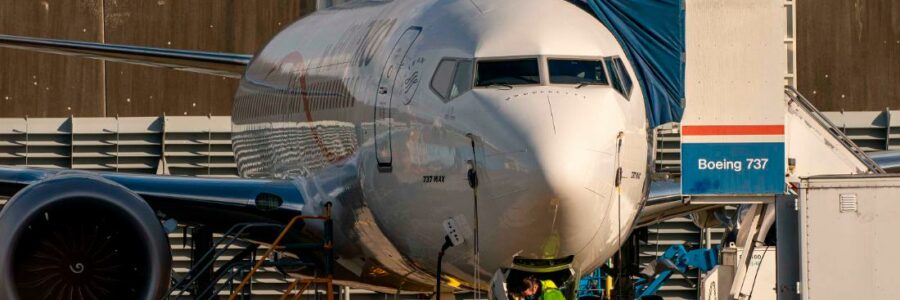
Boeing's 737 Max returns to commercial service
New York (CNN Business)Wednesday marked a grim anniversary for Boeing and hundreds of families worldwide — two years since the fatal crash of a 737 Max flown by Ethiopian Airlines that killed all 157 people on board. While the human toll outweighs the financial accounting of the crisis, the dollar cost is likely to make Boeing’s 737 Max safety issues one of the most costly corporate mistakes ever.
Boeing (BA) has already detailed about $21 billion in costs associated with the crisis, including nearly $9 billion in compensation for airlines that couldn’t or still can’t use those jets, and about $11 billion in increased production costs associated with the slower rate of building that will last for years.
And then there are the $744 million in additional costs — so far — mostly from storing hundreds of Max jets built during the grounding that Boeing couldn’t deliver. Even with Boeing customers now getting those planes, it will be well into 2023 before airlines take possession of them.
And that doesn’t begin to even address Boeing’s legal exposure. The company paid a $244 million fine to settle criminal fraud charges late last year. But that was just the start of the costs. Boeing has announced two victims compensation funds, one created in 2019 for $100 million, another part of a fraud settlement for an additional $500 million. And most of the families of victims have yet to settle their lawsuits against the company. It could face an additional $500 million in legal costs by some estimates.
Indirect costs mount as well
There are also lost sales for the 737 Max. Typically — even during a downturn in air travel — airlines are reluctant to cancel orders for jets because of significant fees and penalties. But the grounding dragged on so long the penalties clause in the sales contracts were no longer in effect. By the time the Covid-19 pandemic caused air travel to ground to a near halt, Boeing was already flooded with order cancellations for the Max — nearly 800 of the planes.
A 737 Max typically sells for about $55 million. Under the worst-case scenario for Boeing is that it could lose as much as $44 billion in revenue from the drop in sales.
Experts say Boeing will eventually sell those planes, albeit it at a steep discount, perhaps even to the same customers who are now canceling their orders. So even if Boeing doesn’t lose the full $44 billion from canceled orders, the lower pricing on the Max could cost it tens of billions.
Boeing won’t comment on sales prices for any of its planes.
And then there are Boeing’s the increased borrowing costs — Boeing took on tens of billions in debt during the crisis, most of it at about a 5% interest rate. That means the interest will pile up by perhaps $3 billion or $4 billion, said Chris Denicolo, aerospace credit analyst with Standard & Poor’s.
Beyond those hard costs there remains the question of how the crisis has affected Boeing’s competitive position.
Before the crashes the company was working on plans for a new, longer range, mid-size plane that could compete the A321XLR now being sold by rival Airbus with a 2023 target date for its debut. Boeing says it hasn’t stopped work on developing its competing offering, popularly referred to as the 797, but it is well behind its original plans for the plane.
Boeing desperately needed a new offering to compete with the A321XLR, said Richard Aboulafia, aerospace analyst for the Teal Group. The duopoly enjoyed by Boeing and Airbus makes it unlikely that either company will go out of business. But not being competitive with Airbus in this key part of the market is a serious long-term threat to Boeing, he said.
“It could end up with only 25% to 30% of market,” he said. “It doesn’t mean you go away, but you’re a lot less profitable, a lot less relevant.”
A fateful anniversary
The March 10, 2019, crash was the second fatal accident involving the jet, following an October 2018 crash of a Lion Air 737 Max plane that killed 189 people. While no action was taken after the first crash, the second incident led to a 20-month global grounding of Boeing’s best selling plane, as the aircraft maker tried to come up with an acceptable fix to the malfunctioning safety system that caused the crashes.
The US Federal Aviation Administration and aviation regulators for 159 other countries have at last approved the plane to carry passengers again, and airlines are rapidly returning it to service. Southwest Airlines, (LUV) which owns more Max jets than any carrier, will become the 15th airline to carry passengers on them once its 737-Max jets return to the air on Thursday.
Several family members of the crash victims met with US Transportation Secretary Pete Buttigieg Wednesday to express their concerns over the US approval for the plane to fly again. Others said the dollar cost of the 737 Max crisis don’t begin to measure what they lost.
“We lost the most beautiful, caring, active, thoughtful, intelligent person,” said Chris Moore, of Toronto, whose 24-year old daughter, Danielle, was killed on the Ethiopian jet. “The true cost of this loss is immeasurable, but this cost accrues to the family of Danielle Moore every minute of every day and night and especially during sleep. These costs are real.”
The families are seeking a new US grounding for the Max, which they are unlikely to get. But 35 regulators around the globe have thus far refused to allow the plane to carry passengers, including China, where more than 20% of the planes are based.
The longer those groundings last, the more problems, and costs, for Boeing.
Source: Read Full Article
